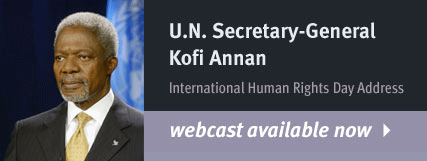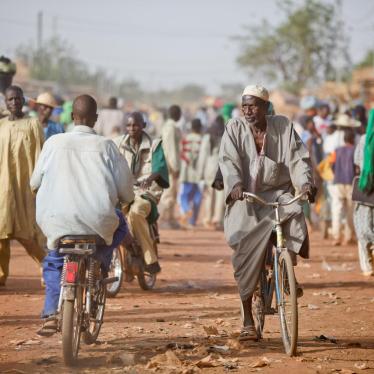The outgoing United Nations Secretary-General Kofi Annan today delivered a ringing condemnation of the world’s failure to halt the bloodshed in Darfur, Human Rights Watch said today. He also warned against violating human rights in the fight against terror, saying governments that abandon the moral high ground play into the hands of terrorists.
In a speech to 500 guests organized by Human Rights Watch, Annan questioned whether he had succeeded, after 10 years in office, in making the United Nations into an effective defender of human rights. “To judge by what is happening in Darfur, our performance has not improved much since the disasters of Bosnia and Rwanda,” Annan said. “Sixty years after the liberation of the Nazi death camps, and 30 years after the Cambodian killing fields, the promise of ‘never again’ is ringing hollow.”
Annan’s speech, in honor of International Human Rights Day on Sunday December 10, 2006, marks his farewell to the post he has held for two terms. He used the occasion to set out steps that UN members and the incoming secretary-general should take to improve the situation, starting with the need to build upon the “momentous doctrine”, agreed by world leaders last year, of the responsibility to protect against crimes against humanity.
“We must develop the responsibility to protect into a powerful international norm that is not only quoted but put into practice, whenever and wherever it is needed,” Annan said.
The doctrine has yet to be applied to the horror in Darfur, he noted. “There is more than enough blame to go around,” Annan said. “It can be shared among those who value abstract notions of sovereignty more than the lives of real families, those whose reflex of solidarity puts them on the side of governments and not of peoples, and those who fear that action to stop the slaughter would jeopardize their commercial interests.”
Annan was critical, too, of countries “in the global south” for “caricaturing responsibility to protect as a conspiracy by imperialist powers to take back the hard-won national sovereignty of formerly colonized peoples.” This, he said, was “utterly false.”
It is vital, Annan said, to take action before a genocide is underway. He urged UN members and his successor, Ban Ki-Moon, who will be inaugurated next week, to push through an action plan for the prevention of genocide.
The secretary-general dismissed the suggestion – often cited now, for example, in the context of northern Uganda – that peace can trump justice. Sierra Leone and the Balkans showed that “justice has often bolstered lasting peace, by de-legitimizing and driving underground those individuals who pose the greatest threat to it,” Annan said. “That is why there should never be an amnesty for genocide, crimes against humanity and massive violations of human rights. That would only encourage today’s mass murderers – and tomorrow’s would-be mass murderers – to continue their vicious work.”
In his speech, Annan was sharply critical of the methods used by Washington to conduct its “war on terror”, and warned against “abandoning the moral high ground and playing into the hands of the terrorists.”
“We need an anti-terrorism strategy that does not merely pay lip-service to the defense of human rights but is built on it,” Annan said. “That is why secret prisons have no place in our struggle against terrorism, and why all places where terrorism suspects are detained must be accessible to the International Committee of the Red Cross. Leading promoters of human rights undermine their own influence when they fail to live up to these principles.”
As part of its “war on terror,” the US government has repeatedly “disappeared” those it accuses of terrorism and held them in secret prisons without access to Red Cross representatives as part of its “war on terror.” It has also flouted the international ban on torture by authorizing certain abusive interrogation techniques.
In a parting shot clearly directed at the Bush administration, Annan warned, too, against making exceptions to the rules on torture. “Once we adopt a policy of making exceptions to these rules or excusing breaches of them, no matter how narrow, we are on a slippery slope. The line cannot be held half way down. We must defend it at the top.”
Annan also expressed his dismay at the failures of the new Human Rights Council in Geneva, which he helped bring into existence in the hope that it would reinvigorate the UN’s human rights work. In practice, this has not happened. Annan welcomed the recent decision to address the Darfur crisis, but criticized the council’s one-sided focus on Israel to the exclusion of many other issues, which has damaged the council in its first few months of existence.
Annan noted the continuing importance of addressing country-specific situations, which some on the council want to move away from. Responding to those who want to deprive the council of its most powerful weapon, Annan affirmed that some governments “will continue to merit condemnation.”
He delivered a ringing call, especially to African leaders, to build a Human Rights Council that lives up to its promise. “Unless Africa wholeheartedly embraces the inviolability of human rights, its struggle for security and development will not succeed,” Annan said. “Many African governments are still resisting the responsibility to protect. Many, even among the most democratic, are still reluctant to play their role in the Human Rights Council by speaking out impartially against all abuses. They can, and must, do more.”
Annan praised the role of non-governmental organizations worldwide. “Without the spotlight you shine, abuses would go unnoticed,” he said. “In return, we must do everything to protect you from harassment, intimidation and reprisal, so you can carry on your vital work.”
Kenneth Roth, executive director of Human Rights Watch, introduced Annan for the speech at the Lincoln Center’s Rose Theater in New York. “As secretary-general, Annan has placed human rights at the top of the UN’s agenda,” said Roth. “He will be a hard act to follow. But we look to Ban Ki-Moon to continue Annan’s strong, outspoken leadership on human rights.”









